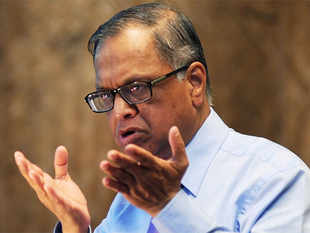- jamahir's foreword - questions to be answered by india's old middle-class, the new middle-class and the neo-rich to be found in bangalore, poona, gurgaon and hyderabad...
and narayanmurthy's statement are ironic considering his own army of computer engineers haven't given the world any radical new microprocessor, operating system or computer.
south asia ( especially pakistan and india ) as a whole is a region whose seven decades have seen no technological or political contribution to the world.
----------------
No invention, earth shaking idea from India in 60 years: NR Narayana Murthy
By PTI | 15 Jul, 2015, 05.55PM IST
"Our youngsters have not done much impactful research work despite being equal to their counterparts in intellect and energy in Western universities," he said.BENGALURU: There has not been a single invention from India in the last 60 years that became a household name globally, nor any idea that led to "earth shaking" invention to "delight global citizens", IT
czar N R Narayana Murthy said today.
"Our youngsters have not done much impactful research work despite being equal to their counterparts in intellect and energy in Western universities," he said delivering the convocation address at the
Indian Institute of Science here.
Listing out 10
major inventions that Massachusets
Institute of Technology has created in the last 50 years that includes Global Positioning System, Bionic Prostheses and Microchip, Murthy said these happened because students and faculty at
MIT "
walked the untrodden path, asked the unasked questions and used their intellectual prowess to take huge leaps".
"They demonstrated unusual courage to achieve the plausibly-impossible. The story is similar at many other western institutions of
higher education," he said.
He said almost all inventions such as cars, electric bulb, radio, television, computers, Internet, wifi, MRI, laser, robots and many other gadgets and technology happened, "thanks to the research by Western Universities".
He added: "On the other hand, let us pause and ask what the contributions of Indian institutions of higher learning, particularly IISc ans IITs, have been over the last sixty-plus years to make our society and the world a better place?
"Is there one invention from India that has become a household name in the globe? Is there one technology that has transformed the productivity of global corporations? Is there one idea that has lead to an earth shaking invention to delight global citizens?"
Co-founder of the country's major IT firm
Infosys said: "Folks, the reality is that there is no such contribution from India in the last 60. The only two ideas that have transformed the productivity of global corporations -- The Global Delivery Model and the 24-hours workday came from the company called Infosys."
----------------
- jamahir's afterword : all colleges in india ( except the medical, films, music, fashion and architectural ones ) must be shut down as these are fit only to produce mindless drones who can only do jobs and create nothing.
in the last 13 to 14 years, the computer college courses in india, whether bachelor level, whether phd level, have produced at least 2 million "graduates"... what have they given to the world... in the last three years, some universities like "lovely professional university, jalandhar" even have "space courses"... does the gentle reader think these institutes are really worth the respect the width of a molecule??
once these colleges are shut-down and the government provides survival money to people instead of wasting money on armaments, creative people will find freedom to take the flights of fancy and innovate, create, design, contribute.
narayanmurthy has put a important point.
----------------
@levina @thesolar65 @jbgt90 @IrbiS @WAJsal @The_Showstopper @haviZsultan @bongbang @BDforever @hinduguy















